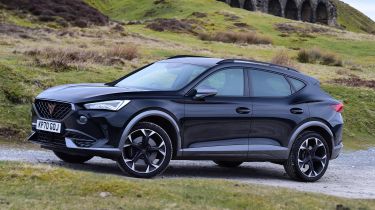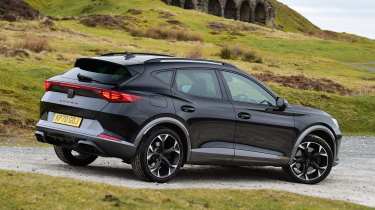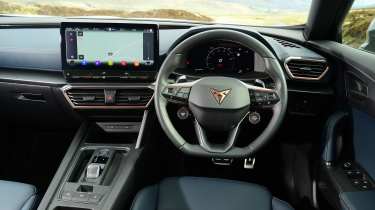Used Cupra Formentor (Mk1, 2020-date) buyer's guide: stylish and family-friendly
A full used buyer's guide on the Cupra Formentor that has been on sale since 2020
Verdict
It would be easy to dismiss the Cupra Formentor as nothing more than a dressed-up SEAT Ateca, but it’s much more than that. It drives differently, it’s a much sharper-looking SUV, and it’s also better equipped with a more premium interior. You pay extra for all of this, but it’s not hard to argue that it’s money well spent, at least as a used buy. When we pitched a Formentor against a Peugeot 408, the Cupra came out on top, and it was the same when we put the top-spec model against the Alfa Romeo Stelvio in a three-way test that saw the Porsche Macan claiming first place – but not by as big a margin as you might think, because the Formentor really is that good.
Over the past few years, mass-market brands have been squeezed as new-car buyers embrace companies selling at the top of the market as well as at the bottom. The result has been an increase in premium sub-brands, such as DS (Citroen), Genesis (Hyundai) and Cupra (SEAT).
Spanish firm SEAT collaborated with the VW Group for eight years before being taken over in 1990, and under the German firm’s direction, Cupra became SEAT’s performance badge, in the mould of a GTi or Type R, before being hived off in 2020.
Used - available now

2024 Cupra
Formentor
20,629 milesAutomaticPetrol1.5L
Cash £22,200
2024 Cupra
Formentor
29,417 milesAutomaticPetrol1.5L
Cash £20,506
2024 Cupra
Formentor
29,047 milesAutomaticPetrol2.0L
Cash £23,124
2024 Cupra
Formentor
19,677 milesManualPetrol1.5L
Cash £20,300Cupra’s first standalone model, the Formentor, would go on to become the brand’s biggest-selling car, and just a few weeks ago a refreshed model was unveiled. But how does the original version stack up as a used buy?
History
The first Formentors were delivered at the end of 2020, with only the 2.0 TSI 310 4Drive available to start with. Within a few weeks the range had been bolstered by a 148bhp 1.5 TSI petrol engine, above which was the 187bhp 2.0 TSI.
Next came a pair of e-Hybrid editions, both powered by a 148bhp 1.4 TSI petrol engine, connected to a 114bhp electric motor, which was powered by a 13kWh battery. This plug-in hybrid came in 242bhp form only at first, but by April 2021 a 201bhp edition had joined the line-up.
Across this model range there was a choice of six trim levels: V1, V2, VZ1, VZ2, VZ3 and VZ Edition. Just 100 of the latter came to the UK, because it was a special launch model celebrating the car’s arrival.
Which one should I buy?
The 148bhp 1.5 TSI engine is fine, if unexciting. The 2.0 TSI and e-Hybrids are more fun to drive, so we’d opt for one of these. Even the entry-level V1 comes with 18-inch alloys, privacy glass, LED head and tail-lights, digital instrumentation, navigation, Apple CarPlay and Android Auto, sports seats, three-zone climate control and rear parking sensors.
The V2 adds park assist with front parking sensors, a powered tailgate, heated front seats, Nappa leather trim, 19-inch wheels, a rear camera and a heated steering wheel.
Move to VZ1 trim, and this adds dynamic chassis control and sports suspension, while the VZ2 includes electrically adjustable memory seats and paddle shifters for the gearbox. The VZ3 has Brembo brakes, while the VZ Edition gets a panoramic roof.
Alternatives to the Cupra Formentor
The mid-sized SUV segment is bursting with options, whether you want something that focuses on sportiness or practicality – or in some cases, both. The Alfa Romeo Stelvio has a foot in both camps and its prices start at around the same point as the Cupra, but there are only petrol and diesel engines, with no electrified options.
The BMW X2 however, comes with plenty of fuel choices, plus it’s smart and well made. The Audi Q3 and Mercedes GLA both offer high-quality cabins with impressive powerplants, while the Volkswagen T-Roc is related to the Formentor, so it shares a lot of the technology, but surprisingly there are no electrified powertrains.
The Renault Arkana and Lexus NX do come in hybrid form though, while the Peugeot 408 has a plug-in hybrid option.
What to look for
Guarantee
The warranty ran for three years/60,000 miles, until 3 April 2024 when it was increased to five years/90,000 miles.
Five star
From July 2021, enthusiasts could buy a 385bhp five-cylinder 2.5 TSI VZ5. However, this was made in left-hand drive only.
Flagship
A VZN edition was introduced in June 2023. It’s based on the 2.0 TSI 310 VZ3 but features sportier styling plus extra standard kit.
Plug-in range
Expect a real-world 28-mile range with a plug-in hybrid, and an average of 50-60mpg depending on how many long-distance drives you do.
Interior
As a Volkswagen Group product, the Formentor is as user-friendly as you’d expect, but there are also plenty of nice touches that lift it above the humdrum. The build quality is predictably excellent, the seats are comfortable and supportive, and there’s even room for five adults, thanks to ample head and legroom.
Refinement levels are impressive and the materials used feel suitably premium, although entry-level models can feel a bit underwhelming, while the infotainment is hit and miss. Plug-in e-Hybrid models have a 345-litre boot, non-hybrids boost this to 450 litres, although four-wheel- drive editions cut this to 420 litres.
Prices
There are plenty of used Formentors, most of them V1s and V2s. The VZ1 and VZ3 are much rarer, but there’s no shortage of VZ2s. More than three quarters of cars are autos, while about a quarter are plug-in hybrids. The VZ Edition and VZN are both very rare.
To check prices on a specific model head over to our valuation tool.
Running costs
All Formentors come with a choice of fixed or variable maintenance schedules. The latter allows up to two years or 18,600 miles between services; the fixed maintenance regime means attention every 12 months or 9,600 miles, with services alternating between Minor and Major at £229 and £349. Those on the Flexible system need a £349 service every time.
The brake fluid needs to be replaced after three years, then every two years, at £69. Formentors with four-wheel drive need a transmission oil change every three years, and this is priced at £130. The big cost though, is to replace the cambelt on the 1.5 TSI engine, which has to be done every 15 years or 186,000 miles, at a very hefty £1,100.
Recalls
Ten recalls is disappointing, with the first campaign launched in December 2020, as the first cars were being delivered. The problem was a faulty Front Assist system.
There were two recalls in 2021: seatbelts working loose (August) and brake failure (September). Another three campaigns followed in 2022, the first because of engine covers detaching (March), followed by a recall because of faulty fuses in plug-in hybrids. More than 10,000 Formentors were recalled in June 2022 because of airbag wiring harness problems.
In 2023 there were three more recalls for rear airbag glitches (February), suspension failures (July) and collapsing engine mounts (October). The most recent recall came in January 2024, because of the potential for brake fluid leaks on some cars with a DSG transmission.
Driver Power owner satisfaction
Cupra is yet to make its Driver Power debut, because none of its models have appeared in our surveys. With no owner reviews on carbuyer.co.uk, our best insight into what owners think is to look at the SEAT Ateca’s Driver Power results; a 63rd position in the 2023 new car poll isn’t great, but this mid-sized SUV is getting on. Owners don’t like the running costs or reliability, but value gets a thumbs up.










